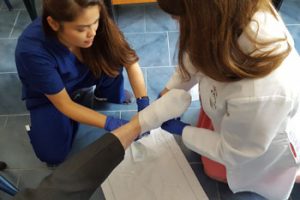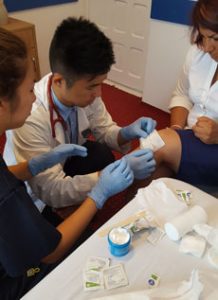Carrying 850 pounds of medications and medical supplies, food to share and selfless dedication, a team of USC PharmD students journeyed to Romania as part of the school’s Global Health Initiative. Led by Associate Professor of Clinical Pharmacy Naomi Florea, they collaborated with local physicians and pharmacists to deliver much-needed care over two weeks in July.
The countryside in Romania is beautiful, but life there can be harsh. Nearly half the population lives in rural areas, where unemployment is high and assets are sparse. The World Bank estimates that 70 percent of rural Romanians live below the poverty line, and the nation’s infrastructure remains ill-equipped to meet their health, educational and other needs. Still, the students were heartened by the openness, spirit and courage of the Romanians they met.
Tam Phan, a third-year pharmacy student, describes one of his patients as a “warrior.” She has four children, including an infant, he says, “and her family has no access to basic resources — let alone medical care. She told me all the money her family makes goes to the children because she puts them as first priority.”
Phan adds that the woman prays each day that her children will have better lives than she’s had. She welcomed the student caregivers into her home — one of a number of Romanians who did so.
Providing much-needed care and empathy

Aided by three local physicians and Romanian medical students acting as translators, the USC team treated 600 patients with chronic diseases, including diabetes, asthma, congestive heart failure and parasitic infections common in the agricultural region.
Third-year student Jessica Chandler called it a privilege to provide care for people in an area where a trip to the doctor might cost someone their food for a week.
The team met a woman who had suffered traumatic brain injury due to severe domestic abuse, and a little girl who had narrowly escaped attempts at human trafficking. They saw untreated wounds and fungal infections. They saw numerous patients in hypertensive crisis, and a 6-year-old boy who had been wrongly diagnosed with schizophrenia and prescribed antipsychotic medication after suffering night terrors.

“We saw a lot of people who had never seen a physician for their conditions,” Florea says.
The trip is the latest in a series of clinical outreach travels that Florea has organized to enable students to gain invaluable professional — and personal — experience by aiding the medically underserved around the world.
“There are no words for how much of an inspiration Dr. Florea is to me and our team,” says Chandler.
Florea, in turn, was moved by the kindness and the capabilities of the students, who worked long hours in hot and stressful conditions. “They were so kind, had so much empathy, had so much compassion for these patients,” she says. “They came in students; they walked out clinicians. They undoubtedly made the Trojan Family proud.”


